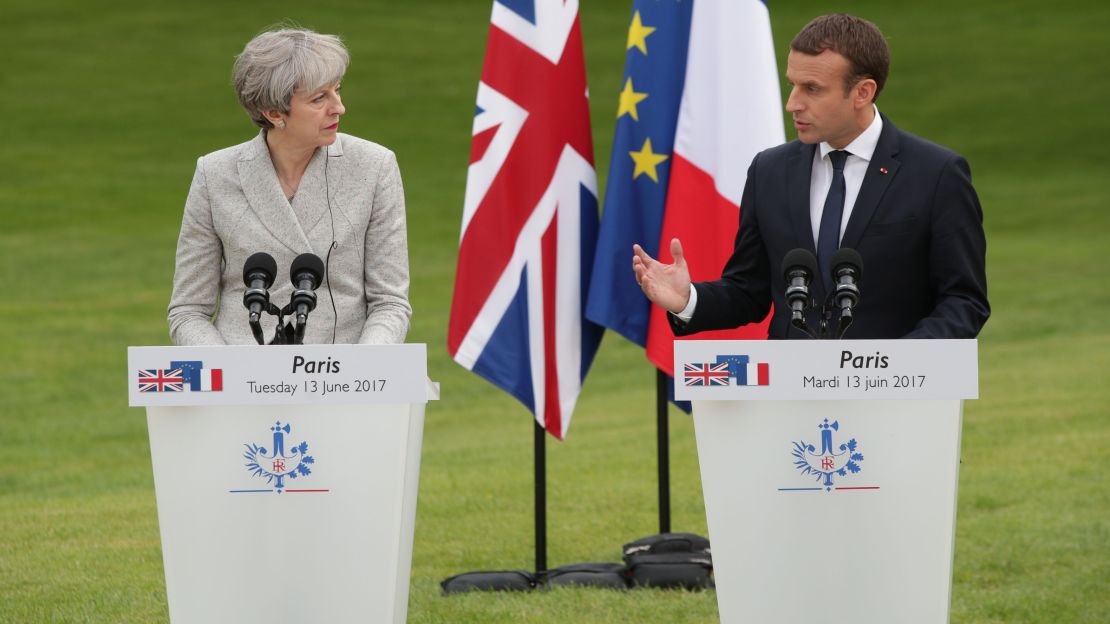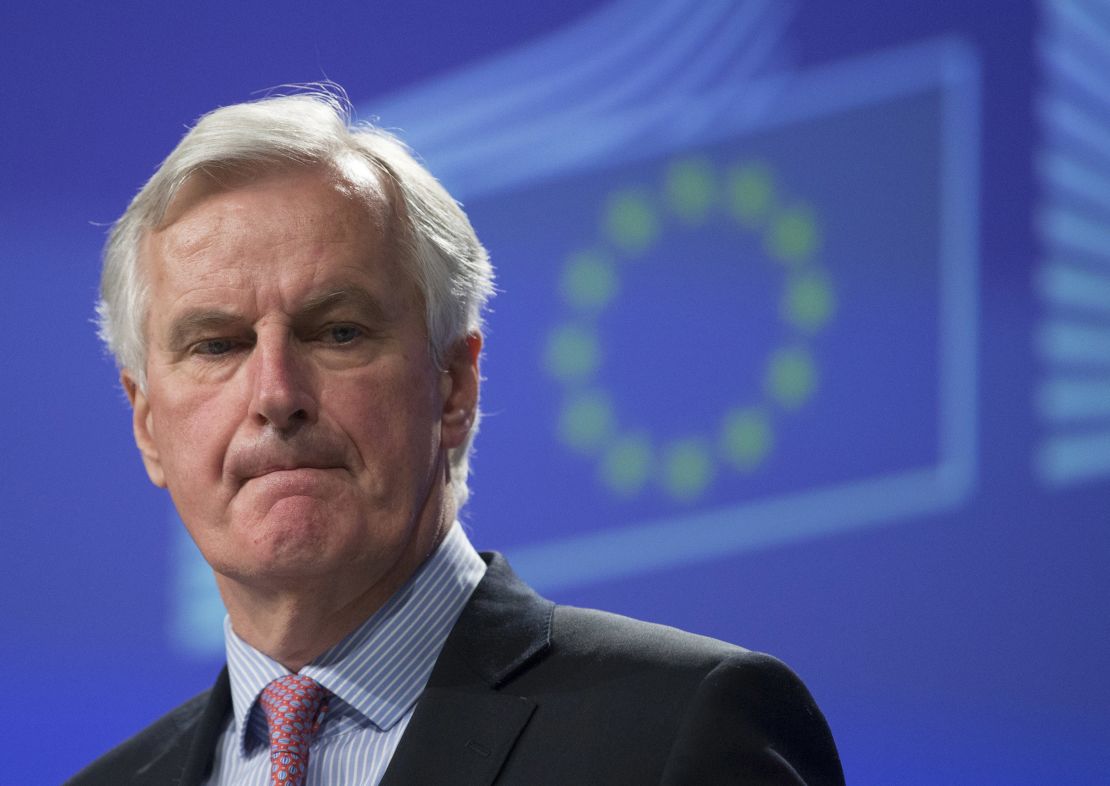Brexit negotiations will begin next week despite the Conservative Party’s stinging election performance last week, Britain’s Prime Minister Theresa May confirmed on Tuesday.
May also reaffirmed the timetable for the country’s departure from the European Union remains on track after talks with French President Emmanuel Macron in Paris.
The British PM had arrived in the French capital to discuss measures to tackle online extremism before attending a football match between the two nations, where a moment of silence paid tribute to the victims of Manchester and London.
“We have been very clear that we want to maintain a close relationship and a close partnership with the EU and individual member states in the future,” May said at a joint press conference. “And I confirmed to President Macron that the timetable for the Brexit negotiation remains on course and will begin next week.”

The British leader said last week’s snap election presented “a unity of purpose” among British voters to move forward with leaving the bloc and that there is “willingness and intent” from all involved to secure the best arrangement for both sides.
The newly elected French leader said that he hopes the exit talks will start as “quickly as possible” adding that the door is still open should Britain choose to stay.
“A sovereign decision was taken by the British people and that is to come out of the European Union,” Macron said, adding, “Until the negotiations come to an end, of course, there is always the possibility to reopen the door.”
“But let us be clear and organized and once the negotiations have started we should be well aware that it’ll be more difficult to move backwards.”
May’s arrival in the French capital comes three days after Macron’s La Republique En Marche party was projected to claim a huge majority in the country’s parliamentary election.
In contrast to May’s disappointing election result, Macron’s party is expected to claim between 415 and 445 seats in the lower house when next Sunday’s second round of voting concludes.
Analysis: EU want Brexit talks after UK election chaos
‘I can’t negotiate with myself’
May’s confirmation comes hours after the European Union chastised the UK for not treating Brexit negotiations with a greater sense of urgency.
Earlier on Tuesday in an interview with various European publications, the European Union’s chief negotiator Michel Barnier warned that time is “passing quicker than anyone believes – because the subjects we need to deal with are extraordinarily complex from a technical, judicial and financial point of view.”
“I can’t negotiate with myself,” he added.

Going further, Barnier had urged London to appoint a negotiating team in order to start talks as soon as possible.
“I need a British delegation on the other side of the table, a head of the British delegation that is stable, accountable and that has a mandate,” Barnier said.
The Brexit negotiator asked London not to “waste time” and explained it will take “several months to draw out the conditions of an orderly withdrawal, with difficult and sensitive points of discussion.”
He also pointed out that three months after Article 50 had been triggered, formal discussions had yet to start.
“We haven’t negotiated, we haven’t progressed. Thus we must begin this negotiation. We are ready as soon as the UK itself is ready,” he said.
Read: Merkel says EU ready for Brexit talks
Barnier also dismissed the idea of extended negotiations beyond the end date of March 2019, indicating he wants all discussions concluded by November 2018 at the latest.
“If we work seriously, I see neither the usefulness nor the interest of pushing back this date. Why? Because every extra delay is a source … of instability that we don’t need, which the economy doesn’t need, which employment doesn’t need.”
German FM: ‘Let’s start the talks’
Despite the disappointing results last week, German Finance Minister Wolfgang Schaeuble said after speaking to his British counterpart, Phillip Hammond, he believes the UK government will now start to pick up its feet on Brexit negotiations.
Schaeuble said in a televised Bloomberg interview that Hammond had relayed that the party is now trying to work out what it means that “a lot of young voters voted for Labour, not for the Conservative Party.”
The German finance minister added that the outcome of the UK election had parallels to the recent French polls, in which many younger voters showed a strong pro-European sentiment when it came to the ballot box.
Opinion: European unity might still be doomed
“There is a new opportunity to bring Europe forward,” he said, explaining that both Hammond and he agreed from the first day that Brexit was a “situation they had to accept” and that they had to minimize the potential damage and maximize the mutual benefit.
When asked if he thought there was a possibility Brexit won’t happen, Schaeuble said it was not valuable to speculate on that.
“The British government has said we will stay with the Brexit. We take the decision as a matter of respect. But if they wanted to change their decisions, of course, they would find open doors,” he said.
Increased pressure
Barnier’s comments will heap more pressure on May, who called the snap general election to give her a stronger hand at the Brexit negotiating table.
After failing to achieve a majority, May met with the Democratic Unionist Party of Northern Ireland on Tuesday in the hopes of cobbling together a deal to ensure her minority government can get its Queen’s Speech – a flagship annual event in which the government lays out its policy agenda for the coming year – through Parliament.
Read: The two women who saved Theresa May could yet be her undoing
May’s courting of the DUP for a potential “confidence and supply” relationship around key votes has drawn criticism because of the party’s stance on same-sex marriage and abortion.







